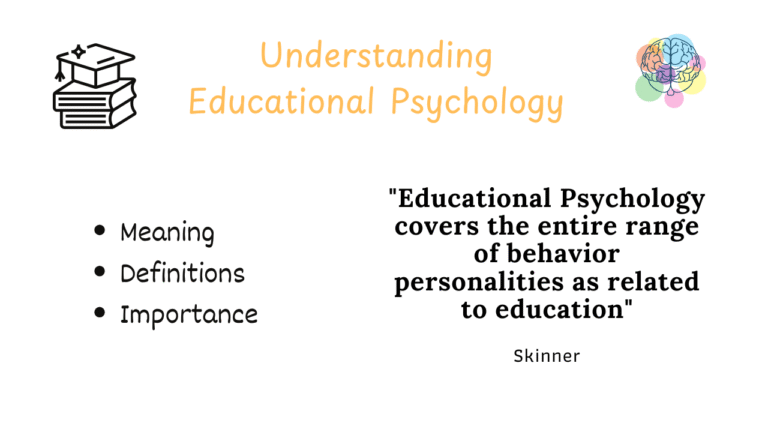In this Post, we provided short notes on Educational Psychology that are helpful for B.Ed university exams or other teaching exams. These notes cover the definitions, importance, and scope of educational psychology, which can be a helpful resource for students and teachers. Educational psychology helps in understanding how learners think, behave, and grow, and provides a scientific base for effective teaching and learning.
Psychology:
Psychology is the Study of Human Behaviour – It deals with the behavior of human beings in educational situations. Its main focus is on psychological factors affecting the teaching and learning process.

Meaning of Educational Psychology:
The term Educational Psychology has two core words, Education and Psychology.
- Education modifies human behavior, while
- Psychology studies human behavior.
Educational Psychology is a guidance process that helps in the all-around development of a child.
- Educational Psychology is a branch of psychology.
- It is an applied psychology that helps the teacher in education to modify or shape human behaviour.
Definitions of Educational Psychology
According to Skinner
” Educational Psychology covers the entire range of behavioral personalities as related to education. “
According to Crow & Crow
” Educational Psychology describes and explains the learning experiences of an individual from birth through old age. “
Importance of Educational Psychology
- It helps the teacher to know the learner’s needs and interests.
- It is helpful to understand the individual differences of different learners in the classroom.
- It helps in the formation of the curriculum.
- It helps to understand the stages of Growth and Development of a child.
- For the selection of appropriate teaching aids and materials.
- It helps to facilitate the effective teaching and learning process.
- It helps in better Classroom Management
- It helps to create an Inclusive Learning environment for the learners.
- It helps to boost student Motivation
- It helps to understand or study the behaviour of a learner.
- It helps in shaping or forming students’ behavior.
- It helps to enhance the teaching methods or teaching strategies of the teacher.
- It provides guidance to the teachers and learners.
Educational psychology plays a crucial role in shaping teaching and learning experiences.
Educational Psychological theories and principles help the educators to facilitate an effective teaching and learning process that enhances student engagement in the classroom, creates a positive learning environment, and helps select appropriate teaching aids and methods.
Hi, I’m Amit Kumar — the author of SoloAspirant.
I am a part-time blogger and tutor with a background in Physics and a B.Ed. Through this platform, I share study materials, notes, and PYQ PDFs curated to help aspirants prepare effectively for teaching and competitive exams.




